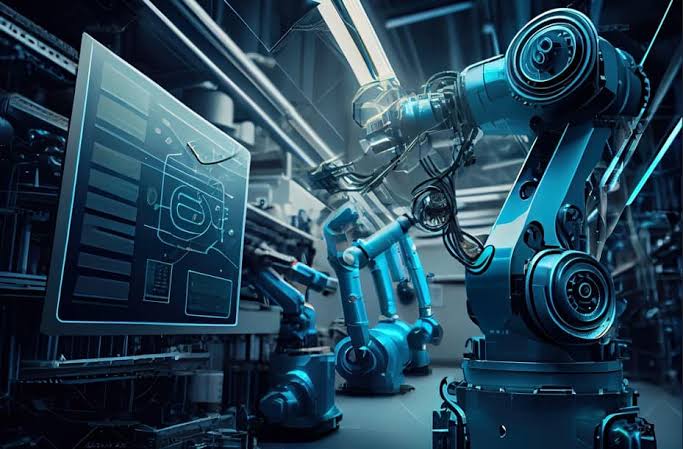Explore the benefits and challenges of AI automation in manufacturing. Discover how AI can enhance efficiency, decision-making, and product quality, while also addressing the complexities of integration, costs, data security, and workforce impact. Learn strategies to overcome these obstacles and drive innovation in your manufacturing processes.
Artificial Intelligence (AI) automation is increasingly transforming manufacturing industry offering numerous benefits but also presenting several challenges. As manufacturers seek to enhance efficiency, reduce costs and improve product quality AI automation emerges as powerful tool with potential to revolutionize production processes. However, integrating AI into manufacturing operations is not without complexities and obstacles.
Understanding AI Automation in Manufacturing
AI automation involves using artificial intelligence technologies to perform tasks traditionally carried out by human operators. This can include range of applications such as predictive maintenance. Quality control robotics and process optimization are also included. By leveraging machine learning algorithms and data analytics, AI automation aims to streamline operations increase productivity and achieve greater precision in manufacturing processes.
Benefits of AI Automation in Manufacturing
One primary advantage of AI automation is its ability to enhance efficiency. Automated systems can operate continuously without need for breaks. This leads to significant improvements in production speed and output. AI-driven machines can handle repetitive tasks with high accuracy. This reduces likelihood of human error and ensures consistent product quality. Efficiency translates into cost savings for manufacturers. Automated systems can minimize waste lower labor costs and optimize resource utilization.
AI automation also contributes to improved decision-making and predictive capabilities. By analyzing vast amounts of data in real-time, AI systems provide valuable insights into production processes and equipment performance and market trends. Predictive maintenance allows manufacturers to anticipate and address potential equipment failures before they occur. This reduces downtime and maintenance costs. Additionally AI algorithms can optimize supply chain management inventory control and production scheduling. This leads to more informed and strategic decision-making
Another significant benefit of AI automation is impact on product quality and customization. AI technologies enable precise control over manufacturing processes. This results in higher-quality products with fewer defects. In addition AI-driven systems can facilitate customization by adapting production processes to meet specific customer requirements. This flexibility allows manufacturers to offer personalized products and respond quickly to changing market demands
Challenges of AI Automation in Manufacturing
Despite advantages, implementing AI automation in manufacturing poses several challenges. One of primary obstacles is high initial investment required for AI technologies and infrastructure. Integrating AI systems often involves substantial costs for equipment software, training. Small and medium-sized enterprises (SMEs) may find it particularly challenging to bear these expenses. This potentially creates a barrier to adoption.
Another challenge is complexity of integrating AI into existing manufacturing processes. AI automation often requires significant changes to workflows. This includes production lines and employee roles. This integration process can be disruptive. It may necessitate substantial reconfiguration of manufacturing systems. Additionally ensuring that AI systems seamlessly interact with legacy equipment and technologies can be technically demanding
Data security and privacy are also concerns associated with AI automation. Reliance on data collection and analysis raises questions about security of sensitive information. Manufacturers must implement robust cybersecurity measures to protect against data breaches and unauthorized access. Ensuring compliance with data protection regulations and safeguarding intellectual property are critical considerations when adopting AI technologies
The need for skilled personnel is another challenge in implementing AI automation. Successful deployment and management of AI systems require expertise in areas like data science machine learning, robotics. Finding and retaining qualified professionals with necessary skills can be difficult. Organizations may need to invest in training and development programs to build internal expertise.
Ethical considerations and impact on workforce are also important factors to address. AI automation has potential to displace certain job roles. This is particularly true for those involving repetitive or manual tasks. Manufacturers must consider implications for employees. They should explore strategies for reskilling and upskilling workforce. Ensuring a smooth transition for affected workers addressing concerns about job displacement, are essential for maintaining positive organizational culture and social responsibility.
Future Prospects and Solutions
Looking ahead integration of AI automation in manufacturing is expected to continue evolving. Advances in AI technologies, such as improvements in machine learning algorithms and robotics will likely drive further innovations in manufacturing processes. To overcome challenges associated with AI automation manufacturers can explore several strategies.
One approach is to focus on incremental implementation. Gradually introducing AI technologies in specific areas of production process allows manufacturers to assess their impact. They can make necessary adjustments. This phased approach can help mitigate risks and manage costs effectively.
Collaboration with technology providers and industry experts can also facilitate successful AI implementation. Partnering with experienced vendors and consultants can provide valuable insights, technical support and access to cutting-edge technologies. Engaging with industry networks and participating in research and development initiatives can further support innovation and address challenges.
Investing in employee training and development is crucial for maximizing benefits of AI automation. By providing workers with skills needed to operate and manage AI systems manufacturers can ensure smooth transition. This enhances workforce capabilities. Developing training programs that focus on both technical skills and soft skills, such as problem-solving and adaptability can help employees thrive in an AI-driven environment.
In conclusion, AI automation offers substantial benefits for manufacturing industry including increased efficiency, improved decision-making and enhanced product quality. However challenges associated with high costs, integration complexities data security and workforce implications must be addressed. By adopting strategic approaches and focusing on continuous improvement, manufacturers can leverage AI automation to drive innovation and achieve long-term success
